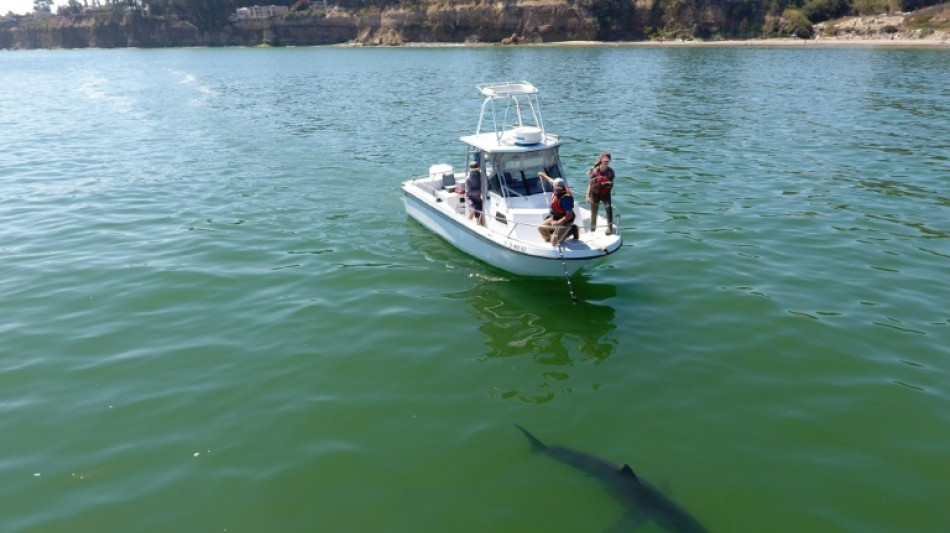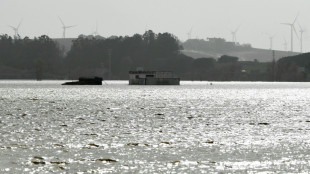
-
 French cycling hope Seixas dreaming of Tour de France debut
French cycling hope Seixas dreaming of Tour de France debut
-
France detects Russia-linked Epstein smear attempt against Macron: govt source

-
 EU nations back chemical recycling for plastic bottles
EU nations back chemical recycling for plastic bottles
-
Terror at Friday prayers: witnesses describe blast rocking Islamabad mosque

-
 Iran expects more US talks after 'positive atmosphere' in Oman
Iran expects more US talks after 'positive atmosphere' in Oman
-
US says 'key participant' in 2012 attack on Benghazi mission arrested

-
 Why bitcoin is losing its luster after stratospheric rise
Why bitcoin is losing its luster after stratospheric rise
-
Arteta apologises to Rosenior after disrespect row

-
 Terror at Friday prayers: witness describes 'extremely powerful' blast in Islamabad
Terror at Friday prayers: witness describes 'extremely powerful' blast in Islamabad
-
Winter Olympics men's downhill: Three things to watch

-
 Ice dancers Chock and Bates shine as US lead Japan in team event
Ice dancers Chock and Bates shine as US lead Japan in team event
-
Stellantis takes massive hit on 'overestimation' of EV demand

-
 Stocks rebound though tech stocks still suffer
Stocks rebound though tech stocks still suffer
-
Spanish PM urges caution as fresh rain heads for flood zone

-
 Iran says to hold more talks with US despite Trump military threats
Iran says to hold more talks with US despite Trump military threats
-
Russia accuses Kyiv of gun attack on army general in Moscow

-
 Cambodia reveals damage to UNESCO-listed temple after Thailand clashes
Cambodia reveals damage to UNESCO-listed temple after Thailand clashes
-
Norway crown princess 'deeply regrets' Epstein friendship

-
 Italy set for Winter Olympics opening ceremony as Vonn passes test
Italy set for Winter Olympics opening ceremony as Vonn passes test
-
England's Jacks says players back under-fire skipper Brook '100 percent'

-
 Carrick relishing Frank reunion as Man Utd host Spurs
Carrick relishing Frank reunion as Man Utd host Spurs
-
Farrell keeps the faith in Irish still being at rugby's top table

-
 Meloni, Vance hail 'shared values' amid pre-Olympic protests
Meloni, Vance hail 'shared values' amid pre-Olympic protests
-
Olympic freestyle champion Gremaud says passion for skiing carried her through dark times

-
 US urges new three-way nuclear deal with Russia and China
US urges new three-way nuclear deal with Russia and China
-
Indonesia landslide death toll rises to 74

-
 Hemetsberger a 'happy psychopath' after final downhill training
Hemetsberger a 'happy psychopath' after final downhill training
-
Suicide blast at Islamabad mosque kills at least 31, wounds over 130

-
 Elton John accuses UK tabloids publisher of 'abhorrent' privacy breaches
Elton John accuses UK tabloids publisher of 'abhorrent' privacy breaches
-
Lindsey Vonn completes first downhill training run at Winter Olympics

-
 Digital euro delay could leave Europe vulnerable, ECB warns
Digital euro delay could leave Europe vulnerable, ECB warns
-
Feyi-Waboso out of England's Six Nations opener against Wales

-
 Newcastle manager Howe pleads for Woltemade patience
Newcastle manager Howe pleads for Woltemade patience
-
German exports to US plunge as tariffs exact heavy cost

-
 Portugal heads for presidential vote, fretting over storms and far-right
Portugal heads for presidential vote, fretting over storms and far-right
-
Suicide blast at Islamabad mosque kills at least 30, wounds over 130: police

-
 Russia says Kyiv behind Moscow shooting of army general
Russia says Kyiv behind Moscow shooting of army general
-
Greenland villagers focus on 'normal life' amid stress of US threat

-
 Iran, US hold talks in Oman after Trump military threats
Iran, US hold talks in Oman after Trump military threats
-
Stocks waver as tech worries build

-
 Dupont, Jalibert click to give France extra spark in Six Nations bid
Dupont, Jalibert click to give France extra spark in Six Nations bid
-
'Excited' Scots out to prove they deserve T20 World Cup call-up

-
 EU tells TikTok to change 'addictive' design
EU tells TikTok to change 'addictive' design
-
India captain admits 'there will be nerves' at home T20 World Cup

-
 Stellantis takes massive hit for 'overestimation' of EV shift
Stellantis takes massive hit for 'overestimation' of EV shift
-
'Mona's Eyes': how an obscure French art historian swept the globe

-
 Iran, US hold talks in Oman
Iran, US hold talks in Oman
-
Iran, US hold talks in Oman after deadly protest crackdown

-
 In Finland's forests, soldiers re-learn how to lay anti-personnel mines
In Finland's forests, soldiers re-learn how to lay anti-personnel mines
-
Israeli president visits Australia after Bondi Beach attack

| SCS | 0.12% | 16.14 | $ | |
| GSK | 1.11% | 59.835 | $ | |
| NGG | 0.79% | 87.585 | $ | |
| CMSC | -0.19% | 23.505 | $ | |
| BTI | 1.55% | 62.933 | $ | |
| BCC | 1.65% | 90.66 | $ | |
| BCE | -0.71% | 25.39 | $ | |
| AZN | 3.29% | 193.53 | $ | |
| CMSD | 0.17% | 23.931 | $ | |
| RIO | 2.12% | 93.09 | $ | |
| JRI | 0.76% | 12.979 | $ | |
| RBGPF | 0.12% | 82.5 | $ | |
| RYCEF | 0.3% | 16.67 | $ | |
| VOD | 2.7% | 15.025 | $ | |
| BP | 2.05% | 38.97 | $ | |
| RELX | -1.67% | 29.595 | $ |

Climate change draws great white sharks north, threatening ecosystem
There never used to be young great white sharks basking off the busy beaches of central California, but as climate change starts to bite, warmer waters are enticing them north -- with possibly catastrophic consequences for a whole ecosystem.
Despite their fearsome reputation, brought about in part by the "Jaws" movie franchise, the main risk from these predators is not to swimmers and surfers -- or even the local police chief -- but to otters.
"What we've been finding is that over time the number of bites on sea otters has increased in this region drastically," says marine ecologist Salvador Jorgensen of California State University Monterey Bay.
"That's having a real impact on the sea otter population."
And -- in an illustation of how interconnected ecosystems are -- that could have far-reaching consequences for all kinds of species in this wildlife-rich area.
- Warm water -
Great white sharks are some of the most majestic, most studied, and most feared of ocean dwellers.
Growing to around 16 feet (4.9 meters), they roam the world's seas thousands of feet deep to satisfy a voracious appetite for seals, sea lions and dolphins.
They live for upwards of 70 years and give birth to litters of live pups, who are left to fend for themselves from an early age.
But because white sharks are endotherms -- warm-bodied, like mammals -- youngsters are vulnerable to the cold of the ocean depths, and spend their time in warmer pockets of water in coastal regions.
Until a decade or so ago, that meant juveniles would only be found as far north as southern California.
But, says Jorgensen, that's changing.
"We documented the sudden occurrence of much smaller sharks than had ever been seen here before," he told AFP in Monterey Bay, hundreds of miles (kilometers) north, where he attaches acoustic transmitters to individuals that allow him to track their travels.
"As ocean temperatures have been warming through a series of El Ninos, and heat waves, many species have been shifting their range further north further towards what were historically cooler areas."
That's what brings them into contact with sea otters, who hang around in the rich kelp forests offshore.
- Sea urchins -
"Smaller sharks are transitioning from eating fish and squid to a point where they're going to start eating marine mammals," says Jorgensen
"To an inexperienced shark, an otter may seem like the right target, but it turns out that otters don't have a rich blubber layer, (so) once they're bitten, they're actually not consumed. But often those interactions are fatal for the otter."
Aside from this being bad news for the individual, it's terrible news for the otter population -- setting off a cascade effect.
Otters forage for sea urchins, a species that left unchecked will graze a kelp forest into a barren desert, killing a vital marine habitat that provides food and shelter for a suite of invertebrates, fish, mammals and birds.
Without the otters, the kelp dies; without the kelp, scores of ocean species struggle.
- Climate change -
For Eric Mailander, an amateur scientist and boat skipper who helps Jorgensen tag great whites, the presence of young sharks in Monterey Bay offers a chance to see a truly impressive creature up close.
"The excitement is always there," he said.
"It's like the first time I saw a shark, it never goes away. If I go out and see a shark, I'm excited."
While the very visible presence of these enormous creatures so close to the shore can raise concerns among humans, Mailander says people don't need to be too worried -- despite the creature's reputation.
"'Jaws' scared the bejesus out of me. But I want people to know not to fear them. Just go look at them."
For Jorgensen it's a vivid illustration of just how rapidly we are altering our planet, with the unchecked burning of fossil fuels.
"I've always thought that this is a very tangible way that people can understand climate change," says Jorgensen.
"People who live on that beach, bring their children there, never had a bunch of sharks swimming 20 feet away, and now it's a regular sight.
"You can't look out at the ocean and think that climate change is not happening."
M.AbuKhalil--SF-PST




